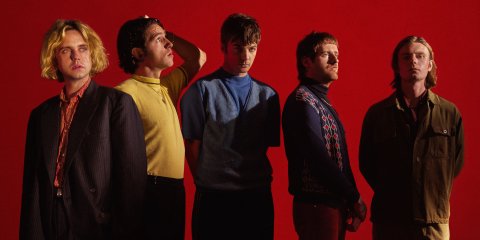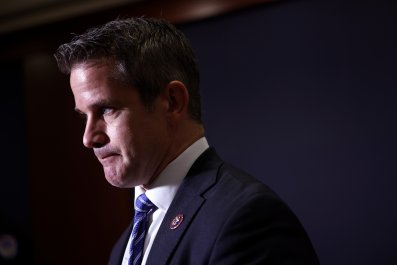
Just prior to their move from Dublin to London a few years ago, the members of the Irish rock band Fontaines D.C. came across a newspaper story about Margaret Keane, a woman who was born in Ireland but lived in Coventry, England, for most of her life before her death in 2018. Keane's family wanted her gravestone to carry the Gaelic inscription "In ár gCroíthe go deo" ("in our hearts forever"). However, the Church of England denied the request, arguing that the phrase could be viewed as political.
To Fontaines D.C. singer and songwriter Grian Chatten, the incident was like staring down the barrel of a gun given the tensions between the Irish and British that have lasted for centuries. "We were just about to move to a country that regarded Irishness in and of itself as a political statement," he tells Newsweek. "There's not a differentiation between an expression of Irish culture and it being linked to terrorism or perceived as terrorism. That was a bit shocking and upsetting."
The story inspired Fontaines D.C. to record "In ár gCroíthe go deo," the six-minute dramatic opening track of the band's new album, Skinty Fia, due out on April 22 via Partisan Records. A continuation of the band's thoughtful yet explosive post-punk music since their remarkable debut, 2019's Dogrel, Skinty Fia encapsulates the feelings of the five members of the band—Chatten, guitarists Carlos O'Connell and Conor Curley, bassist Conor Deegan III and drummer Tom Coll—on what it means to be Irish while living in London due to the high cost of rent in Dublin.
"There is a spirit or a soul to the record more than a connecting theme," Chatten says about Skinty Fia. "What happened was we all moved to London, and during that time we all experienced a kind of shockingly lingering prejudice against Irish people. I think those things definitely influenced the record a lot, but so did the quietness and consistency that came with lockdown and living somewhere and not touring—getting to know a place truly for the first time in years."
Skinty Fia (an Irish expression that translates as "the damnation of the deer"), shows an expansion of Fontaines D.C.'s guitar-driven rock sound while retaining the band's energetic playing and Chatten's moody vocal delivery "I think there's a slightly more of a breakbeat/drummer-based/jungle thing that was explored a little bit on the second record [2020's A Hero's Death] with songs like A Lucid Dream.' I think we do that a bit more on [Skinty Fia] with "In ár gCroíthe go deo." He also cites the reflective "The Couple Across the Way," which features only his vocals and an accordion as another example of the group branching out musically. "That's probably my most enduring favorite of the album. I'm getting sort of comfortable and confident enough [with] the initial idea of a tune and not feel pressured in any way to anchor it down with the material trappings of being in a guitar band—to retain this kind of buoyant, free-rhythm structure of just being a voice and an accordion."
The band's perspectives about Ireland and Irish identity while living in London (like in the rhythmic "Roman Holiday"), along with personal matters, all find their way on several of Skinty Fia's heartfelt songs, like "How Cold Love Is" ("It's just that classic kind of double-edged sword: love is a kind of place for you to go and be hurt," explains Chatten). Another standout is "Jackie Down the Line," the album's first single. "I find it useful to build bridges between ourselves and people that we feel inclined to demonize," he says. "I think that there's information and truth to be gleaned from relating to the people that we believe to be the worst people in society, as opposed to just kind of drawing a big thick line."
Then there's the simmering "Bloomsday," which refers to the annual June 16 commemoration in Dublin of James Joyce's Ulysses. But instead of it being a celebration, the song signals the end of something. "I wrote that when I was in the state of mind of 'I'm about to leave Dublin' and move on from this chapter of my life where I romanticize the dreary humdrum, rainy, beautiful historical streets of Dublin. On Bloomsday, they retrace the footsteps of the characters in Ulysses, and I felt like that was something that we were almost doing for years as a band—just as friends, really—we were trying to sort of live with the ghosts of Dublin's literary past. I think I wanted to do one last one of those and kind of say goodbye to it."
The centerpiece of the album is the blistering "I Love You," Despite its title, the track is a turbulent and fiery expression of Chatten's feelings about the current societal and political issues affecting Ireland; the lyrics mention the political parties Fianna Fáil and Fine Gael, and reference the recent scandal involving a mass grave of children buried at the Bon Secours Mother and Baby Home in the town of Tuam. "My own lyrics reveal themselves to me well after I've written them a lot of the time," Chatten says. "There seem to be different problems that I'm talking about. It's just an expression or in general an acknowledgment of these different issues that are affecting me and people like me."
Having now lived away from Ireland for almost two years, Chatten says he still loves the Emerald Isle, where he first moved shortly after his birth in the U.K. to an English mother and Irish father. But he also feels conflicted about Ireland—part of which, he says, has to do with the country's long pandemic lockdown and its accompanying restrictions. "My last few visits there have been tainted by public anger, aggression, people turning on each other, people watching each other and monitoring each other's movements. It was kind of a panopticon vibe about it. People were very, very angry. I saw some interactions on the streets that I haven't seen for a few years. I need to go over there, now that it's opened back up, so I can kind of see it in a happy state again."

"It's completely marred with political and social problems at the moment," he says. "It's a tax haven for multi-national corporations—Facebook, Apple, Google and all the rest are moving there. And it's a government that isn't popular with young people. Huge, beautiful culturally significant buildings are being knocked down every other day and being replaced by hotels to host corporate conferences and that. It's changing at a rapid rate, and it's quite sad."
Fontaines D.C.'s shared love of both their Irish roots and of poetry can be traced to the members' first meeting as students at the British and Irish Modern Music Institute in Dublin. "I didn't have any friends that were into poetry at all until I met them," says Chatten. "I was probably 20 years old. It just seems like [loving poetry] was kind of a dirty little secret for me growing up and I think for them as well. But when I went to college and met those guys, I felt like we were finally able to talk about stuff like that. I don't think I ever said the word 'beautiful' until I met Carlos. I was too afraid to say the word 'beautiful,' which is a mad thing for me to think of now. I think it was in our first rehearsal we were saying stuff like, 'We're the best band in the world.' It was half-facetious, half-deadly-serious fun."
In the last three years since Dogrel, Fontaines D.C. (the name is a reference to the Johnny Fontane character from The Godfather and Dublin City) have been on a whirlwind ascent. Aside from glowing reviews with each new album release along with major touring, the group had previously scored nominations for the Mercury Prize and a Grammy Award. In early March, Fontaines D.C. won the honor of ''Best Band in the World'' at the BandLab NME Awards in London.
"I couldn't handle it for the first year, maybe two years, at all," Chatten says of the attention. "I developed insomnia really badly on tour. Just the knowledge that hundreds of thousands of people knew my name, knew my face or knew of my existence, and the idea that there would be a conversation about me in another part of the world between people at a party—all that kind of stuff really freaked me out. It's totally unnatural and I wasn't ready for it. I'm glad that people are listening, though, because I'm enjoying the freedom to create more. Now I think I've developed a much thicker skin...I've developed into a slightly more rounded person."
Chatten says the band members are closer than ever. "We still hang out with mostly each other before and after, and in between rehearsals or whatever. I think we all have the feeling that we're probably gonna be godfathers to each other's kids. We have a trust in the writing room now where you can just walk in and say, 'Right, let's do a tune in an hour,' and by the end of the hour, we'll be wishing that we give ourselves more time because we're enjoying it so much. It's a very healthy relationship."
Fontaines D.C. will be touring this year in the U.S., Europe and Ireland. Asked what's been the highlight so far in the band's career, Chatten surprisingly doesn't mention the accolades or touring, but rather the Margaret Keane incident that prompted the track "In ár gCroíthe go deo." Last year, Keane's family won an appeal to have that phrase finally inscribed on her gravestone. "They reached out when they saw a tracklist published for this album," says Chatten, "and they asked for the song. They said they loved the song. And they played it actually at her gravestone. That was probably the most overwhelming, validating, and just lovely thing that's happened to me, so far."

FURTHER LISTENING
Dogrel
Partisan Records, 2019
Fontaines D.C.'s debut album Dogrel left an impression on fans and critics with its passionate, guitar-charged rock and hard-bitten lyrics about life in Dublin. For instance, the cab driver in "Boys in the Better Land": "He spits out 'Brits out,' only smokes Carroll's" or the opening line from "Big," "Dublin in the rain is mine/ A pregnant city with a Catholic mind." In addition to the rave reviews, the LP netted Fontaines D.C. a nomination for Britain's prestigious Mercury Prize.
A Hero's Death
Partisan Records, 2020
The band avoided the sophomore jinx with A Hero's Death, which was mostly written on tour. A sense of dislocation pervades from the opening track, "I Don't Belong" with its chorus "I don't belong to anyone/I don't wanna belong to anyone." Other standouts include the title song and the hypnotic and pummeling "Televised Mind." In an interview with the Guardian, Chatten differentiated the album from Dogrel: "We wrote about the places within as opposed to the places without."
"The Black Angel's Death Song"
from I'll Be Your Mirror: A Tribute to the Velvet Underground and Nico
(Various Artists)
Verve, 2021
To cover one of the most complex and experimental songs from the iconic first Velvet Underground album, The Velvet Underground and Nico, would have been a formidable task for any young band. Fontaines D.C.'s inspired performance echoes not only the original version's avant-garde leanings but also Lou Reed's talk-sung vocal.
David Chiu @newbeats is Newsweek's associate editor and writes frequently about popular music.










